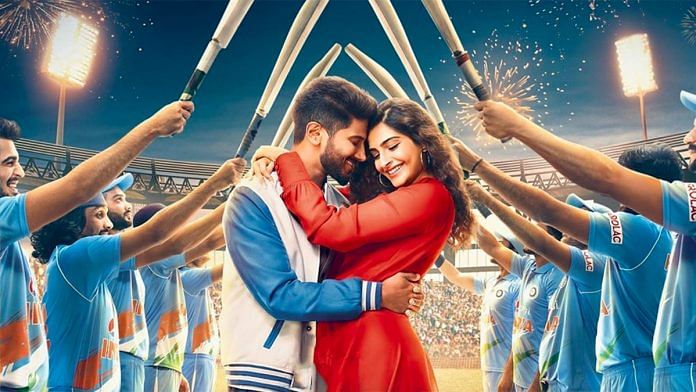New Delhi: It’s been a long wait for The Zoya Factor to hit the screens. Unfortunately, it is not worth the wait. The eponymous book by Anuja Chauhan, on which the film is based, is a zippy, zany ride that, even when in the realm of the totally ridiculous, never loses its sense of fun.
And given that Chauhan is credited with contributing to the film’s dialogue and additional screenplay, it’s surprising that the movie is such a giant, plodding bore.
Sonam Kapoor plays Zoya Solanki, a junior copywriter at an ad agency who comes from a middle-class Army family in North Delhi. That is, middle-class in the Bollywood sense — a gorgeous two-storey house with a lawn in which she sits with her father (Sanjay Kapoor) and brother (Sikander Kher) and watches cricket in clothes that seem more suited to a work event. At her actual place of work, she is shown as unprofessional and immature, and overall, comes across as unnecessarily klutzy and ditzy.
During the shooting of an ad with the Indian men’s cricket team, she reveals to them over breakfast that she was born on the day India had won the World Cup in 1983. This leads the team to believe she is lucky for them, and they start to perform badly whenever she isn’t around.
Captain Nikhil Khoda (Dulquer Salman) doesn’t believe in luck and prioritises hard work. So his board and team’s, and increasingly the country’s, reliance on Zoya for the World Cup irks him. This, along with their budding romance, forms the film’s central conflict, except that unlike in the book, the film lacks layers and nuance, so the conflict, when it does finally plod to the fore, comes off as over-dramatised and contrived.
Also read: The difficulty of being Sonam Kapoor Ahuja
Mess of random emotional outbursts, jingoism
Kapoor’s Zoya has a penchant for breaking the fourth wall and talking to the audience. This could have worked if the writing was crisper and Kapoor was less whiny and annoying, constantly sulking or crying.
As it stands, the constant interruptions only serve to dumb down the script. Kapoor also overdoes the whole “Sainik Vihar girl” thing, channelling Kajol from K3G and playing Zoya as a loud, cretinous caricature. Apart from this, she has no personality or opinions — even when her brother makes a grossly sexist comment about balla versus belan, her response is to whine about how she hates cricket.
Nikhil is saddled with platitudes and clichés, both as team captain and boyfriend, but Dulquer Salmaan does his best with the repetitive, tired dialogue and has a charming presence.
The first half moves along reasonably quickly, though the romance between the leads is unconvincing. And it does have some moments of fun — a guest appearance by Anil Kapoor is actually a riot. But the side characters, that is Zoya’s family and her boss (Koel Purie, unnecessarily melodramatic) add little to the plot.
The second half is where the film totally loses it, becoming a mess of random emotional outbursts and jingoism. It makes a good point about the dangers of excessive deshbhakti in this country, but this is lost in the tangled web of a romance that is so dull, one forgets there even was one.
Too much of the film also focuses on the cricket team members and their internal politics, particularly Robin (Angad Bedi), the thwarted ex-captain who is jealous of Nikhil. He and his villainous machinations to recapture his lost glory are given so much screen time that it takes away any element of surprise or suspense, because every little move is explained in painfully clichéd detail, including thriller-esque music when he is shown plotting his next move.
With an excessive focus on the men in blue and such a poorly fleshed out titular character, one wonders why this film is called The Zoya Factor at all.
Also read: Netflix plans bonuses for filmmakers delivering hits



